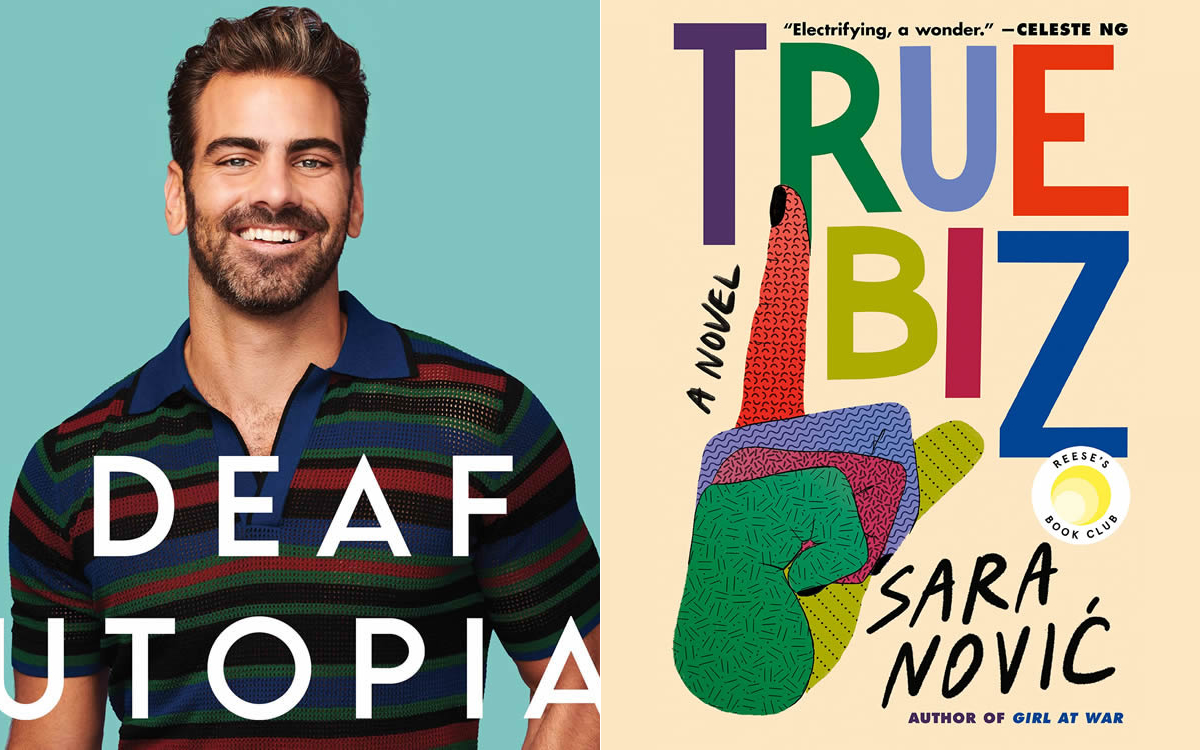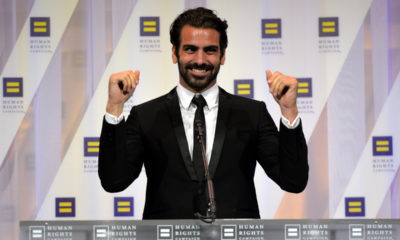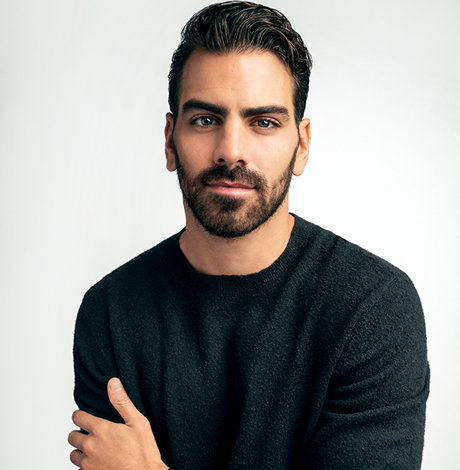Books
Two lively, entertaining new books from Deaf creators
DiMarco’s memoir and Novic’s ‘True Biz’ give visibility to oft-ignored community

‘Deaf Utopia: A Memoir–and a Love Letter to a Way of Life’
By Nyle DiMarco
c.2022, William Morrow
$22.99/336 pages
‘True Biz’
By Sara Novic
c.2022, Random House
$27/388 pages
In the 1970s, while riding the T in Boston, a man tried to get my attention. He seemed to be talking animatedly with his hands. Knowing nothing about sign language, I thought he might be drunk. I ignored him, unfolded my white cane and got off at my stop. I’m legally blind, but have some vision. But, I don’t always recognize people whom I’ve met.
Later that day, I learned that the fellow on the T’s name was Fred and that he was Deaf. He’d seen me at a party and was signing hi to me. Fred, I’m so sorry for my rudeness!
Then, aside from the sad-sack Deaf character in the novel and movie of the same title “The Heart Is a Lonely Hunter,” Deaf people, like queer people, largely, weren’t present in books, movies, TV – anywhere in pop culture. Except as victims, villains or metaphors for loneliness or deviance.
Thankfully, after decades. this is changing. As Troy Kotsur, said of “the Deaf community, the CODA [children of Deaf adults] community and the disabled community,” when he became the first male Deaf actor to win an Oscar, “This is our moment.”
Today, Deaf and disabled people, queer and non-queer, from models to artists to filmmakers to authors are pop culture creators and icons. Two of the most lively, entertaining, moving books out now are by Deaf creators.
“Deaf Utopia” is a fascinating memoir by Nyle DiMarco with Robert Siebert. DiMarco, 32, is proudly Deaf and queer. His parents and grandparents are Deaf. He knows how to keep your attention. His stories range from his first kiss with a man to auditions with reality show execs (who want him, a Deaf guy whose native language is American Sign Language to “use his voice”) to harrowing accounts of being abused by his father.DiMarco is an activist, producer, actor, and model. In 2014, he became the second male winner and first Deaf contestant on cycle 22 of “America’s Next Top Model.”
In 2015, DiMarco, with his professional dance partner Peta Murgatroyd won the Mirrorball Trophy on season 22 of ABC’s “Dancing with the Stars.” His acting credits include roles on “Difficult People,” and “Switched at Birth.” DiMarco, a Gallaudet University graduate and Washington, D.C. resident, was executive producer of the Netflix docuseries “Deaf U.”
Growing up, he and his twin brother Nico had “gotten a taste of the cruelty of hearing people toward the Deaf when childhood bullies mocked our signing,” DiMarco writes.
As with queer people who are mocked as children, DiMarco as he got older came to see that bullying could “take more harmful and sinister forms: blatant oppression and discrimination.”
He learned from his mother that in 1995, five years after the Americans with Disabilities Act was passed, his grandfather was denied an interpreter when he was in the hospital. When he went into surgery, his family didn’t know if his “life was in danger,” DiMarco writes.
The Deaf community isn’t immune to homophobia. As a youth, DiMarco was told the story of an acclaimed, handsome Deaf track sprinter. After marrying a woman, having two children and living the life of the “picture-perfect” family man, he killed himself.
Years later, DiMarco discovered that the legendary athlete was gay, when he met the sprinter’s Deaf European out male lover. The athlete told his lover that he couldn’t come out.
“I wondered how long it would be before I saw him again,” the athlete’s lover told DiMarco, “I never did. Soon after that, he took his own life.”
Despite these sad stories, “Deaf Utopia” is far from a downer. It is filled with moments of pride and exuberance from DiMarco’s mom being there when he and Murgatroyd were awarded the Mirrorball Trophy to when he was asked to be an executive producer of “Deaf U.”
Coming out, DiMarco had to deal with homophobia and being excluded from the queer community because he’s Deaf. He met a lot of “cool” gay people at LGBTQ events and he spoke in American Sign Language at the 2016 Human Rights Campaign annual dinner.
Yet, “my new gay acquaintances were hearing and didn’t know ASL,” DiMarco writes.
But he didn’t give up. With time and patience, DiMarco taught hearing queer people ASL, and hearing LGBTQ people began to include him in their conversations.
“Deaf Utopia” has entertaining dish about what it’s like behind the scenes of reality shows. But it’s not a celeb tell-all.
The memoir is an exhilarating mix of stories of DiMarco’s life and intriguing narratives of Deaf culture. Take just one thing “Deaf Utopia” made me get for the first time: silent movies, with no spoken dialogue, were accessible to Deaf people.
If you’re hearing, you’ll likely be surprised by one sobering story of Deaf history: Alexander Graham Bell was instrumental in having sign language, the native language of Deaf people, banned from schools for the Deaf.
If you like reality shows, dancing and parties laced with queerness and Deaf culture, “Deaf Utopia” is the book for you.
“True Biz” is the dazzling new novel by Sara Novic, a brilliant Deaf writer. Like DiMarco, Novic, author of “Girl at War” and “America Is Immigrants,” is proud of being Deaf.
“To be a member of the Deaf community has been a great source of joy in my life,” she writes in an “author’s note,” “it has made me a better writer, thinker, parent, and friend.”
Schools for Deaf people have been vitally important for Deaf culture, language and community.
“True Biz” is set at the fictional River Valley School for the Deaf. Riverdale is facing closure. The novel’s main characters are February Waters, the headmistress, and two teenage students Austin and Charlie.
February is a CODA (child of Deaf adults). She and her hearing wife Melanie love each other. But like many marriages, their marriage has its strains. February must deal with everything from teen sex to Riverdale’s impending closure.
Austin is a proud Deaf teen. His family has been Deaf for generations. Nothing shakes up his life until he meets up with Charlie, a new student.
Novic is a master of creating characters that burn themselves into your heart. Charlie, who is Deaf, will tug at your heart the most. Her divorced parents are hearing. Her folks won’t let Charlie communicate in American Sign Language. Charlie attends mainstream schools where she meets no Deaf people. Her mom insists that she have a cochlear implant.
When she fails academically, Charlie is sent to Riverdale. Adjusting is hard for her because the Riverdale students communicate with ASL. She has to quickly learn to sign. February asks Austin to help her fit in.
You’ll miss and root for these characters after reading this page-turning novel. You’ll want February and her wife to stay together and good things to happen to Austin and Charlie.
“True Biz” is an American Sign Language idiom. In English, it means “seriously” or “for sure.”
Seriously, read “True Biz.”
The Blade may receive commissions from qualifying purchases made via this post.
Books
How one gay Catholic helped change the world
‘A Prince of a Boy,’ falls short of author’s previous work

Brian McNaught, the pioneering gay activist and author of 1986’s “On Being Gay” and 1993’s “Gay Issues in the Workplace,” has written a personal account about his Catholic faith and homosexuality. It is a memoir without much substance.
“A Prince of a Boy: How One Gay Catholic Helped Change the World” (Cascade Books) is a strong personal statement by McNaught. He helped change family relationships. He helped change attitudes about homosexuality. He helped change workplaces, but the world?

In January 2023, the Catholic News Service reported that Pope Francis announced that, “being homosexual is not a crime.” In December 2023, NPR reported that Pope Francis approved “Catholic blessings for same-sex couples, but not for marriage.” Francis died Monday at age 88. Although Catholics may not see homosexuality as a crime, they see sex outside of marriage as a sin. They see same-sex marriage as a sin.
In 2021, Gallup reported that membership in the Catholic Church had declined 20 percent since 2000. In 2025, the Pew Research Center’s Religious Landscape Study found that nearly 40 percent of Americans identified as Protestant, while the same study found that only 19 percent identified as Catholic.
McNaught devotes much of his book to his life as a gay Catholic. It is challenging to read about his personal struggle. Some readers may find it interesting. Others might find it boring. Catholic readers may find it more compelling than Protestant readers.
As the above statistics prove, McNaught has much more work to do to change the Catholic Church’s views about homosexuality. We should be glad for his contribution to the debate within the Catholic Church. We should pray for full acceptance of gays in the Catholic Church.
“A Prince of a Boy” becomes more interesting when McNaught describes his work as an educator on LGBTQ issues. He has had an impact on workplace policies, academic programs, and public education, and his lectures, books, and other materials are widely used.
Based on my experience in the federal government and volunteering with LGBTQ organizations from the Bay Area to Washington, D.C., I believe McNaught’s work as an educator has improved LGBTQ lives, careers, and families. During the Clinton administration, I gave many copies of “Gay Issues in the Workplace” to personnel directors. I felt their staff could benefit from reading it. I thought it would help the lives and careers of my federal LGBTQ colleagues.
McNaught’s “A Prince of a Boy” was released in December 2024. Anti-gay crusader Anita Bryant died the same month. Bryant campaigned against a gay rights law in Florida. She began a national campaign against gays.
When Bryant successfully reversed a gay rights ordinance in Dade County, Florida, McNaught wrote the important essay “Dear Anita, Late Night Thoughts of an Irish Catholic Homosexual.” The essay is not in “A Prince of a Boy”; however, McNaught mentions Bryant.
In his training programs, McNaught describes homosexuals as journeying from confusion to denial to acceptance to pride. “Anita Bryant and AIDS brought Gay people to identity pride very quickly,” McNaught writes. San Francisco Supervisor Harvey Milk (1930-1978) and other activists reached similar conclusions about Bryant’s vicious anti-gay campaign.
McNaught helped change the LGBTQ world and brought pride to many people’s lives. McNaught walks in pride, works in pride, and educates others in pride.
“A Prince of a Boy” is a disappointing book. It provides small details about Brian McNaught’s large, proud life. A meaningful biography about this great gay leader is long overdue.
The Blade may receive commissions from qualifying purchases made via this post.
Books
‘Pronoun Trouble’ reminds us that punctuation matters
‘They’ has been a shape-shifter for more than 700 years

‘Pronoun Trouble’
By John McWhorter
c.2025, Avery
$28/240 pages
Punctuation matters.
It’s tempting to skip a period at the end of a sentence Tempting to overuse exclamation points!!! very tempting to MeSs with capital letters. Dont use apostrophes. Ask a question and ignore the proper punctuation commas or question marks because seriously who cares. So guess what? Someone does, punctuation really matters, and as you’ll see in “Pronoun Trouble” by John McWhorter, so do other parts of our language.

Conversation is an odd thing. It’s spontaneous, it ebbs and flows, and it’s often inferred. Take, for instance, if you talk about him. Chances are, everyone in the conversation knows who him is. Or he. That guy there.
That’s the handy part about pronouns. Says McWhorter, pronouns “function as shorthand” for whomever we’re discussing or referring to. They’re “part of our hardwiring,” they’re found in all languages, and they’ve been around for centuries.
And, yes, pronouns are fluid.
For example, there’s the first-person pronoun, I as in me and there we go again. The singular I solely affects what comes afterward. You say “he-she IS,” and “they-you ARE” but I am. From “Black English,” I has also morphed into the perfectly acceptable Ima, shorthand for “I am going to.” Mind blown.
If you love Shakespeare, you may’ve noticed that he uses both thou and you in his plays. The former was once left to commoners and lower classes, while the latter was for people of high status or less formal situations. From you, we get y’all, yeet, ya, you-uns, and yinz. We also get “you guys,” which may have nothing to do with guys.
We and us are warmer in tone because of the inclusion implied. She is often casually used to imply cars, boats, and – warmly or not – gay men, in certain settings. It “lacks personhood,” and to use it in reference to a human is “barbarity.”
And yes, though it can sometimes be confusing to modern speakers, the singular word “they” has been a “shape-shifter” for more than 700 years.
Your high school English teacher would be proud of you, if you pick up “Pronoun Trouble.” Sadly, though, you might need her again to make sense of big parts of this book: What you’ll find here is a delightful romp through language, but it’s also very erudite.
Author John McWhorter invites readers along to conjugate verbs, and doing so will take you back to ancient literature, on a fascinating journey that’s perfect for word nerds and anyone who loves language. You’ll likely find a bit of controversy here or there on various entries, but you’ll also find humor and pop culture, an explanation for why zie never took off, and assurance that the whole flap over strictly-gendered pronouns is nothing but overblown protestation. Readers who have opinions will like that.
Still, if you just want the pronoun you want, a little between-the-lines looking is necessary here, so beware. “Pronoun Trouble” is perfect for linguists, writers, and those who love to play with words but for most readers, it’s a different kind of book, period.
The Blade may receive commissions from qualifying purchases made via this post.
‘The Cost of Fear’
By Meg Stone
c.2025, Beacon Press
$26.95/232 pages
The footsteps fell behind you, keeping pace.
They were loud as an airplane, a few decibels below the beat of your heart. Yes, someone was following you, and you shouldn’t have let it happen. You’re no dummy. You’re no wimp. Read the new book, “The Cost of Fear” by Meg Stone, and you’re no statistic. Ask around.

Query young women, older women, grandmothers, and teenagers. Ask gay men, lesbians, and trans individuals, and chances are that every one of them has a story of being scared of another person in a public place. Scared – or worse.
Says author Meg Stone, nearly half of the women in a recent survey reported having “experienced… unwanted sexual contact” of some sort. Almost a quarter of the men surveyed said the same. Nearly 30 percent of men in another survey admitted to having “perpetrated some form of sexual assault.”
We focus on these statistics, says Stone, but we advise ineffectual safety measures.
“Victim blame is rampant,” she says, and women and LGBTQ individuals are taught avoidance methods that may not work. If someone’s in the “early stages of their careers,” perpetrators may still hold all the cards through threats and career blackmail. Stone cites cases in which someone who was assaulted reported the crime, but police dropped the ball. Old tropes still exist and repeating or relying on them may be downright dangerous.
As a result of such ineffectiveness, fear keeps frightened individuals from normal activities, leaving the house, shopping, going out with friends for an evening.
So how can you stay safe?
Says Stone, learn how to fight back by using your whole body, not just your hands. Be willing to record what’s happening. Don’t abandon your activism, she says; in fact, join a group that helps give people tools to protect themselves. Learn the right way to stand up for someone who’s uncomfortable or endangered. Remember that you can’t be blamed for another person’s bad behavior, and it shouldn’t mean you can’t react.
If you pick up “The Cost of Fear,” hoping to learn ways to protect yourself, there are two things to keep in mind.
First, though most of this book is written for women, it doesn’t take much of a leap to see how its advice could translate to any other world. Author Stone, in fact, includes people of all ages, genders, and all races in her case studies and lessons, and she clearly explains a bit of what she teaches in her classes. That width is helpful, and welcome.
Secondly, she asks readers to do something potentially controversial: she requests changes in sentencing laws for certain former and rehabilitated abusers, particularly for offenders who were teens when sentenced. Stone lays out her reasoning and begs for understanding; still, some readers may be resistant and some may be triggered.
Keep that in mind, and “The Cost of Fear” is a great book for a young adult or anyone who needs to increase alertness, adopt careful practices, and stay safe. Take steps to have it soon.
The Blade may receive commissions from qualifying purchases made via this post.
-

 Federal Government3 days ago
Federal Government3 days agoHHS to retire 988 crisis lifeline for LGBTQ youth
-

 Opinions3 days ago
Opinions3 days agoDavid Hogg’s arrogant, self-indulgent stunt
-

 District of Columbia3 days ago
District of Columbia3 days agoD.C. police seek help in identifying suspect in anti-gay threats case
-

 Virginia3 days ago
Virginia3 days agoGay talk show host wins GOP nom for Va. lieutenant guv









